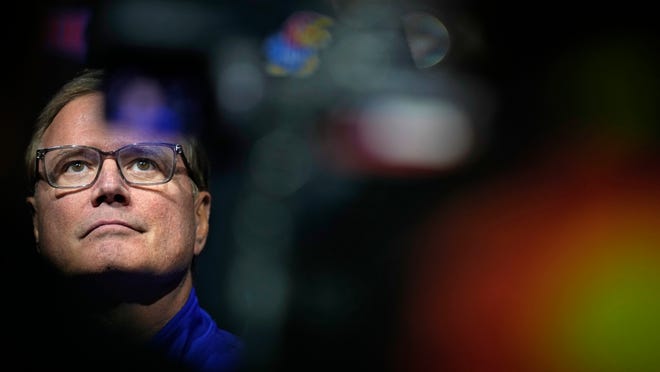
KANSAS CITY, Mo. — Picture a basketball player. Any player. Doesn’t matter who. Visualize them jumping in the air, momentum heading to the basket for a layup. Then BOOM!
Unbeknownst to the ball handler, a defender — completely away from the initial action — saw the shot attempt, slid underneath the shooter and fell backwards, getting the emphatic charge call.
The defender is congratulated for a head’s up play, providing help-side defense for his teammate, who was out of position and got beat off the dribble. His coach praises his tenacity, his basketball IQ and willingness to lay his body on the line in the name of victory.
What you envisioned was actually illegal defense, something that, according to the rules committee, college basketball officials have been incorrectly calling for years.

Rejoice, fans everywhere. The charge is on the brink of extinction.
“It is almost impossible to take a legal charge anymore,” Big 12 coordinator of officials Curtis Shaw said Wednesday in the T-Mobile Center. “Not impossible, but almost.”
For as long as anyone can remember, block-charge calls have been the most heated arguments over officiating. Turns out, fans were right in thinking referees were calling too many. In fact, there probably shouldn’t have been any called at all.
Women’s rule changes:NCAA rule changes: Women’s basketball removes restricted area, adds flopping penalty
“The rules committee basically said, ‘We don’t like the rule,’” Shaw said in his presentation during Big 12 basketball media days. “‘We don’t believe the charge on the secondary defender should be allowed. We think that’s bad defense.’”
Shaw called this change the most significant of his 30-plus years working as a basketball official. In essence, Shaw said, the rules committee decided the call has been wrong for a long time and now was the time to change it.
A smattering of videos were played for the assembled media to show how different the rule will be this year.
“We watched 100 plays from last year that were called charged,” Shaw said, “and 96 of them are now blocks.”
The rule change is significant, to be sure.
Programs across the country — from the college down to the middle-school level — have prided themselves as great defensive teams because of the amount of charges they draw. Texas Tech’s teams under Chris Beard and Mark Adams are chief among those programs.

What made those teams successful, though, will not work anymore. Shaw said officials are now being told that if there is any doubt in the call, it’s a block.
Shaw noted that one play in particular can still be considered for a charge, and that play starts with the ball handler driving baseline. In these plays, the help-side defender has enough room and enough time to step in and plant their feet to draw the charge. Other than that? It’s a block.
Officials are now geared toward allowing physical play as long as it is within reason. Exaggerated reactions — or flops — will not be rewarded.
“I will tell you in the Big 12,” Shaw said, “the only flop calls you’re gonna see is when a jump-shooter shoots and clearly nobody around him and he goes flying to the floor. That’s a flop. That’s a technical foul. But when you have contact in the post, contact on these drives, it’s contact. It’s not a flop. It’s not faking anything. Rule it a block or a charge.”
In more cases than not, it’ll be a block.
More:With expanded Big 12 basketball schedule, teams will have to get creative in non-conference
More:Brett Yormark: Big 12 looking at 20-game men’s, 18-game women’s basketball schedules
